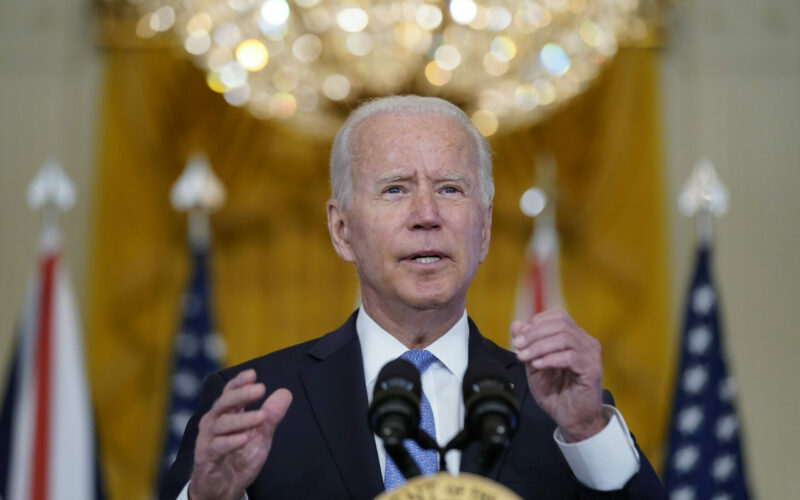
The US president has urged the “free world” to guard against authoritarian threats to democracy, ignoring America’s own history.
As he promised before the election, US President Joe Biden has held a virtual “Summit for Democracy”. Part of its purpose is revealed by his comments and by the guest list.
“America is back”, Biden told the world at his inauguration. Representatives of 111 nations were invited to discuss democracy on December 9 and 10, as if the US is back as leader of the “free world”. Which countries were on and not on the list divides the world according to Biden.
Two nations that predictably failed to make the cut, Russia and China, objected through their ambassadors that it was not for the US to decide which country’s system was or was not democratic. Peace, development, fairness, justice and freedom as well as democracy, they said, were the “common values of humanity” and not the prerogative of one nation or group of nations. In the week before Biden’s summit, China held its own “International Forum on Democracy”.
China, its ambassador argued, was an extensive, “whole-process” socialist democracy which responded to the nation’s realities. It reflected the people’s will and had their strong support. The Russian ambassador said his nation was a “democratic, federative, law-governed state” with a representative form of government. Democracy was its fundamental principle.
When Biden declared that “we have to defend it, fight for it, strengthen it, renew it”, his guests might have thought he was referring to their obligation to support the declining US as much as democracy itself. Some observers claim the real aim of Biden’s summit was to identify America’s friends and isolate its enemies: the many they claim are with the US and the few against it. If so, then the list is puzzling.
Not invited, of course, were Russia, China and North Korea. Invited were South Korea and Taiwan, a democracy which is not a separate country. Not included were Donald Trump’s friends in the House of Saud, nor the long-standing enemies of previous successive presidents: Afghanistan, Iran, Libya, Syria and Yemen. Latin American countries whose democracies produce results the US doesn’t like were out: Bolivia, Guatemala, Honduras, Nicaragua and Venezuela. So were several Middle Eastern states — Bahrain, Kuwait, Qatar and the UAE, but also Jordan. The out-of-favour Turkey, Hungary and Belarus were out, but Poland was in.
The list from Africa was even more confusing: Algeria, Ethiopia, Morocco, Mali, Somalia and Tunisia were out, while Niger, Nigeria, Senegal and others were in. The inclusion of Indonesia, Malaysia, the Philippines and Timor-Leste could be expected, while other ASEAN states, Cambodia, Laos, Myanmar, and Vietnam, were out. But why omit Singapore?
For Biden, the simple choice was between democracy and authoritarianism, and he could write his own guest list. But when he sought to justify it further, the rationale behind his choices got murky. “Authoritarian leaders,” he announced, “are reaching across borders to undermine democracies – from targeting journalists and human rights defenders to meddling in elections.” These unnamed leaders are hardly alone in that: did anyone raise the targeted Julian Assange, whom Biden once called a “high-tech terrorist”? Or Biden’s invitation to a failed coup leader from Venezuela? Or all the meddling the US has done in others’ elections?
The US electoral system, says Melbourne blogger Caitlin Johnstone, is corrupt, from the chaotic voting process itself to the bribery, manipulation, gerrymandering and voter suppression which are widespread. In The Economist’s Democracy Index 2020, the US is grouped with “flawed”’ democracies, below the top-ranked “full” democracies in Scandinavia, Canada, Ireland and New Zealand.
As for foreign interference in US elections, claims by the Democrats against the Russian state have been reliably discounted, while the American record far outdoes Russia’s. Including invasions, coups, colour revolutions and proxy wars, the US is reported to have interfered in other states’ elections 81 times between 1946 and 2000 (Claire Bernish, The Free Thought Project), and more such abuses of democracy have occurred since. Yet Biden proposes imposing new sanctions on countries which don’t meet America’s unilaterally imposed standards for democracy and human rights.
Australia, lacking a bill of rights and human rights protections, and with draconian security laws, remained in the second tier of “full” democracies surveyed by the Democracy Index. A recent critique finds Australia to be not a democracy at all but a “kakistocracy“, that is, governed by the least competent and even the worst available. The government, he writes, is inept, crudely nationalistic, militaristic and obsessed with national security. It is anti-intellectual and contemptuous of the arts; it bonds with political and religious elites; it is cronyist and corrupt and favours special interest groups; and it is fixated on crime and punishment. These, although McKinley doesn’t say so, are some of the characteristics of fascism. He could have added misogyny too.
So how will Australia respond to Biden’s call to states to return in a year with an affirmative agenda for democratic renewal? How will our kakistocratic leaders offer to tackle the threats Biden says are facing democracies? The president calls for “collective action”, which, coming after his assertion that we have to “fight for it, defend it”, sounds ominously belligerent. Whoever wins government in 2022, Australia may be in for a lot more war-talk disguised as defending the democracy we don’t really have.




